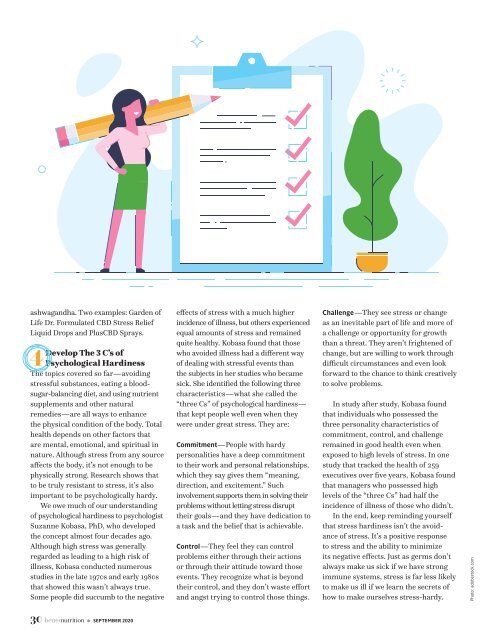Create successful ePaper yourself
Turn your PDF publications into a flip-book with our unique Google optimized e-Paper software.
ashwagandha. Two examples: Garden of<br />
Life Dr. Formulated CBD Stress Relief<br />
Liquid Drops and PlusCBD Sprays.<br />
4Develop The 3 C’s of<br />
Psychological Hardiness<br />
The topics covered so far—avoiding<br />
stressful substances, eating a bloodsugar-balancing<br />
diet, and using nutrient<br />
supplements and other natural<br />
remedies—are all ways to enhance<br />
the physical condition of the body. Total<br />
health depends on other factors that<br />
are mental, emotional, and spiritual in<br />
nature. Although stress from any source<br />
affects the body, it’s not enough to be<br />
physically strong. Research shows that<br />
to be truly resistant to stress, it’s also<br />
important to be psychologically hardy.<br />
We owe much of our understanding<br />
of psychological hardiness to psychologist<br />
Suzanne Kobasa, PhD, who developed<br />
the concept almost four decades ago.<br />
Although high stress was generally<br />
regarded as leading to a high risk of<br />
illness, Kobasa conducted numerous<br />
studies in the late 1970s and early 1980s<br />
that showed this wasn’t always true.<br />
Some people did succumb to the negative<br />
effects of stress with a much higher<br />
incidence of illness, but others experienced<br />
equal amounts of stress and remained<br />
quite healthy. Kobasa found that those<br />
who avoided illness had a different way<br />
of dealing with stressful events than<br />
the subjects in her studies who became<br />
sick. She identified the following three<br />
characteristics—what she called the<br />
“three Cs” of psychological hardiness—<br />
that kept people well even when they<br />
were under great stress. They are:<br />
Commitment—People with hardy<br />
personalities have a deep commitment<br />
to their work and personal relationships,<br />
which they say gives them “meaning,<br />
direction, and excitement.” Such<br />
involvement supports them in solving their<br />
problems without letting stress disrupt<br />
their goals—and they have dedication to<br />
a task and the belief that is achievable.<br />
Control—They feel they can control<br />
problems either through their actions<br />
or through their attitude toward those<br />
events. They recognize what is beyond<br />
their control, and they don’t waste effort<br />
and angst trying to control those things.<br />
Challenge—They see stress or change<br />
as an inevitable part of life and more of<br />
a challenge or opportunity for growth<br />
than a threat. They aren’t frightened of<br />
change, but are willing to work through<br />
difficult circumstances and even look<br />
forward to the chance to think creatively<br />
to solve problems.<br />
In study after study, Kobasa found<br />
that individuals who possessed the<br />
three personality characteristics of<br />
commitment, control, and challenge<br />
remained in good health even when<br />
exposed to high levels of stress. In one<br />
study that tracked the health of 259<br />
executives over five years, Kobasa found<br />
that managers who possessed high<br />
levels of the “three Cs” had half the<br />
incidence of illness of those who didn’t.<br />
In the end, keep reminding yourself<br />
that stress hardiness isn’t the avoidance<br />
of stress. It’s a positive response<br />
to stress and the ability to minimize<br />
its negative effects. Just as germs don’t<br />
always make us sick if we have strong<br />
immune systems, stress is far less likely<br />
to make us ill if we learn the secrets of<br />
how to make ourselves stress-hardy.<br />
Photo: adobestock.com<br />
30 • SEPTEMBER 2020

















